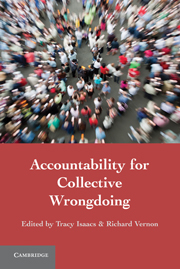Introduction
Published online by Cambridge University Press: 05 June 2012
Summary
The contributions to this volume address a range of questions that arise when we start to consider legitimate ways to respond to collective wrongdoing and collective guilt. The chapters that follow cover an array of topics, from the effectiveness of international courts and tribunals, especially atrocity trials, in achieving postconflict justice to home state responsibility for the conduct of transnational corporations. Many of the contributors engage either directly or indirectly with questions of collective punishment and what justified means, if any, there are to punish collectives. Although the notion of collective responsibility is not the central focus of debate in this volume, the authors attend extensively to what collective responsibility consists in and how it distributes, particularly but not exclusively, in the context of justified forms of collective punishment. The issue of distribution raises questions about the nature of membership and the responsibilities, obligations, and even risks to which membership in a collective such as a state or nation gives rise, particularly if that collective is engaged in wrongdoing.
The chapters address the issues from the multiple disciplinary perspectives of law, political science, and philosophy. The volume is divided into two parts. Part I focuses on collective accountability in international law. Part II focuses on distributing accountability. In truth, many of the chapters fit well into both sections, but those in Part I engage more directly with the international legal structures – such as international criminal tribunals, the International Court of Justice (ICJ), and the International Criminal Court (ICC) – and some of the challenges and limitations that those entities have in addressing collective justice.
- Type
- Chapter
- Information
- Accountability for Collective Wrongdoing , pp. 1 - 20Publisher: Cambridge University PressPrint publication year: 2011
- 4
- Cited by

